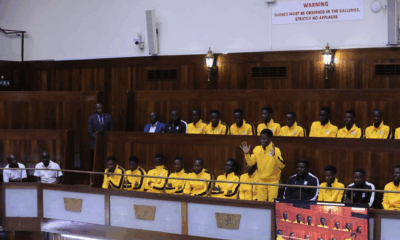News
No MPs in Cabinet -Opondo advises president Museveni
Uganda Media Center Executive Director who is also the government spokesperson Ofwono Opondo has advised his boss President Museveni to abandon the tradition of selecting his cabinet from elected Members of Parliament saying they face a conflict of interest between doing their ministerial jobs and trying to appease the electorate which endangers service delivery in the country.
Opondo says his word of counsel is meant to address challenges in service delivery which many in the establishment believe was the source of many anti-NRM sentiments across the population in the just concluded general elections.
“If my advice is to amount to anything, I would advise the President to avoid selecting elected Members of Parliament when he will be forming the next cabinet.
They get compromised because of their personal political interests in local constituencies and in the process they fail to follow through with government policies which in the end adversely affects service delivery” Opondo says.
Opondo explains that ministers with deep political roots fail to implement important decisions which may be unpopular with their electorates but are of strategic national importance because “they give priority to their personal political interests and are as such reluctant to take a stand on government policies.”
Citing an example of a government plan to levy taxes on some Items, Opondo reasons thus: “They fear to stand by government’s positions for fear of losing votes especially if those taxes are justifiable but undesirable by the people who elected them into Parliament.”
Opondo’s views have received support from some political analysts who argue that it would enhance Uganda’s democracy by improving on accountability through separation of power.
Renowned Constitutional lawyer Prof. Frederick Ssempebwa who also chaired the 2005 Constitutional Review Commission argues that selecting the cabinet outside of Parliament is one of the ways to pursue the ideal of separating power between Parliament and the Executive.
“If members of cabinet are selected from outside parliament, there would be concentration on first of all on the part of the legislators on business in the House without hankering to position themselves for cabinet posts,” Ssempebwa said.
But he expressed pessimism at the (likelihood of) the prospect citing President Museveni’s traditional obsession with selecting cabinet members on the basis of regional balancing but also on the premise that ministerial appointments in Uganda are seen as an appeasement tool rather than a measure of technical competence.
Prominent City Lawyer Peter Walubiri agrees with Prof. Ssempebwa but expressed disappointment at President Museveni’s considerations while appointing cabinet ministers.
“Unfortunately President Museveni does not select cabinet ministers based on qualification but on loyalty,” said Walubiri.
The idea of having executive and not political ministers is one of the celebrated additions to Kenya’s new constitution that came into force in 2010.
Under Kenya’s current constitution, although the executive power is said to be held in the hands of the people, the President who exercises it on behalf of the people can delegate that responsibility to Cabinet Secretaries who are not elected politicians.
Comments



















